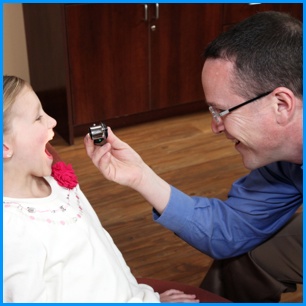Swallowing Conditions & Symptoms
A look at common swallowing conditions: Dysphagia
- Trouble Swallowing
- Drooling
Trouble Swallowing

An infant or child who suffers from difficulty swallowing—also known as dysphagia—will have trouble passing food or liquids down the throat. The act of swallowing is a very complex, coordinated event that involves dozens of muscles and nerves working in coordination. Any number of different conditions can cause dysphagia. Your ENT for Children physician can help diagnose and treat these conditions. Children who experience dysphagia might exhibit it in one of the following types:
- Oral Dysphagia—The child will have difficulty chewing, sucking, or maneuvering food or liquid into the throat
- Pharyngeal Dysphagia—The child will have difficulty swallowing and moving food/liquid down to the esophagus
- Esophageal Dysphagia—The child will experience reduced esophageal motility, or contraction
An infant may also have trouble feeding because of dysphagia. This can lead to aspiration, where liquids pass into the lungs. Another factor that influences how well infants feed is how well they are able to breathe.
Symptoms that are indicative of dysphagia may include:
- Stiffening or arching of the body during feeding
- Gagging or coughing while eating
- Recurring respiratory infections/pneumonias
- Hoarse voice
- Irritability during feeding
- Trouble swallowing during breast feeding
- Frequent vomiting and spitting
- Congestion during meals
- Difficulty chewing
Evaluation of dysphagia may include swallow x-rays, speech therapist evaluation, or an office endoscopy using a fine, flexible camera. Your ENT for Children surgeon might recommend a variety of treatments or surgical procedures for children who suffer from dysphagia.
Drooling
Drooling in infants and toddlers is very common. Children normally stop drooling after the age of 4. A child who has disorders that interfere with the muscles in the face or throat may drool excessively past that age.
Excessive drooling is not caused by excessive production of saliva but by a child’s inability to clear the saliva by swallowing. A child who suffers from a drooling condition might have trouble swallowing properly. ENT for Children might recommend speech or behavioral therapy, surgery, and other treatments for children who drool excessively beyond the age of 4.
Each year over 100 children die from asphyxiation from foreign bodies in the airway in the United States. Most episodes of foreign body aspiration occur in children 5 or younger.
